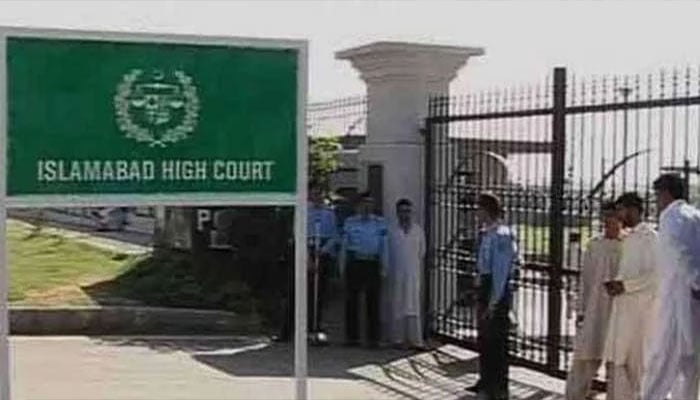Parliamentary proceedings can’t be challenged in court, IHC told
ISLAMABAD: Any decision associated with parliamentary proceedings could not be challenged in the court, Senate Chairman Sadiq Sanjrani's lawyer argued before the Islamabad High Court (IHC) in the Senate election case.
A two-judge bench comprising Justice Aamer Farooq and Justice Tariq Mehmood Jahangiri heard the plea of the Pakistan People's Party (PPP) Senator Syed Yusuf Raza Gilani who had challenged the rejection of his seven votes by the presiding officer in elections for the Senate chairman.
Barrister Ali Zafar pleaded that the powers of Parliament, its officers, committees and members could not be challenged under the law. He said only a single party had challenged the decision of the presiding officer. He said parliamentary or any of its committee's decision could only be discussed in the House.
Justice Aamer Farooq inquired the counsel that in case of any clash between the members of Parliament, either they could register a first information report (FIR) against each other. To this, Barrister Ali Zafar said an FIR could only be registered if anyone was killed in the fight.
Quoting another country's precedence of a quarrel in Parliament, he said the Parliament served a contempt notice to lawyers who challenged the parliamentary violence in the court. He said English courts also treated the parliamentary proceedings as their inner subject. The courts could not interfere directly or indirectly in the affairs of parliament, he contended. The lawyer said Pakistan's Parliament had the same privilege as the British Parliament kept.
Justice Aamer Farooq said traditions were also followed in several matters in Britain. Barrister Ali Zafar said the basic affairs here were similar to the British Parliament. His arguments were based on three points including freedom of expression, sovereignty and powers of Parliament and its members, he said, adding that the institution could not be strengthened without these basic points. He said the House had freedom of expression under Article 66(1) and it had powers to make rules for regulating its procedure and the conduct of its business under Article 67. He said neither a parliamentary matter could be challenged in any court under Article 68 of the Constitution nor the court could raise question on the parliamentary proceedings under Article 69.
The Senate chairman's lawyer said Article 66 also mentioned the privilege of parliamentary members. The 66(1) stated that the speech or vote of any member also could not be challenged in courts. The Constitution had drawn a clear line regarding the powers of Parliament and courts, he said. The court instructed the lawyer to conclude his arguments on the next hearing and adjourned the case till August 10.
-
 Critics Target Palace Narrative After Andrew's Controversy Refuses To Die
Critics Target Palace Narrative After Andrew's Controversy Refuses To Die -
 Sarah Ferguson’s Delusions Take A Turn For The Worse: ‘She’s Been Deserted’
Sarah Ferguson’s Delusions Take A Turn For The Worse: ‘She’s Been Deserted’ -
 ICE Agents 'fake Car Trouble' To Arrest Minnesota Man, Family Says
ICE Agents 'fake Car Trouble' To Arrest Minnesota Man, Family Says -
 Camila Mendes Reveals How She Prepared For Her Role In 'Idiotka'
Camila Mendes Reveals How She Prepared For Her Role In 'Idiotka' -
 China Confirms Visa-free Travel For UK, Canada Nationals
China Confirms Visa-free Travel For UK, Canada Nationals -
 Inside Sarah Ferguson, Andrew Windsor's Emotional Collapse After Epstein Fallout
Inside Sarah Ferguson, Andrew Windsor's Emotional Collapse After Epstein Fallout -
 Bad Bunny's Star Power Explodes Tourism Searches For His Hometown
Bad Bunny's Star Power Explodes Tourism Searches For His Hometown -
 Jennifer Aniston Gives Peek Into Love Life With Cryptic Snap Of Jim Curtis
Jennifer Aniston Gives Peek Into Love Life With Cryptic Snap Of Jim Curtis -
 Prince Harry Turns Diana Into Content: ‘It Would Have Appalled Her To Be Repackaged For Profit’
Prince Harry Turns Diana Into Content: ‘It Would Have Appalled Her To Be Repackaged For Profit’ -
 Prince William's Love For His Three Children Revealed During Family Crisis
Prince William's Love For His Three Children Revealed During Family Crisis -
 Murder Suspect Kills Himself After Woman Found Dead In Missouri
Murder Suspect Kills Himself After Woman Found Dead In Missouri -
 Sarah Ferguson's Plea To Jeffrey Epstein Exposed In New Files
Sarah Ferguson's Plea To Jeffrey Epstein Exposed In New Files -
 Prince William Prepares For War Against Prince Harry: Nothing Is Off The Table Not Legal Ways Or His Influence
Prince William Prepares For War Against Prince Harry: Nothing Is Off The Table Not Legal Ways Or His Influence -
 'How To Get Away With Murder' Star Karla Souza Is Still Friends With THIS Costar
'How To Get Away With Murder' Star Karla Souza Is Still Friends With THIS Costar -
 Pal Reveals Prince William’s ‘disorienting’ Turmoil Over Kate’s Cancer: ‘You Saw In His Eyes & The Way He Held Himself’
Pal Reveals Prince William’s ‘disorienting’ Turmoil Over Kate’s Cancer: ‘You Saw In His Eyes & The Way He Held Himself’ -
 Poll Reveals Majority Of Americans' Views On Bad Bunny
Poll Reveals Majority Of Americans' Views On Bad Bunny




